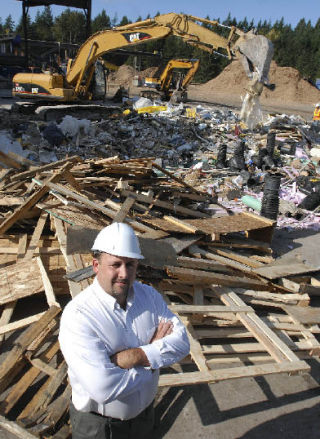The “green” plant on the modest hill just east of Auburn comes to life with a large network of machine-powered conveyor belts rolling into motion.
Hard-hat workers assemble to sift and sort the debris, the rubble and all that can be recycled from what area construction and demolition sites yield.
The process is organized, perpetual and changing – a community at work.
Little time, effort and product are wasted, especially for a company that specializes in squeezing the most out of discarded masses of wood, concrete, metals, plastics, cardboard, asphalt roofing, even stumps and land clearings.
The belts systematically transport the debris to destinations where it is eventually crushed and processed into renewable matter. The yard is filled with mounds of sawdust, wood chips, gravel and crushed asphalt roofing products. Nails and other metals are magnetically removed from wood, collected and recycled.
In the middle of the day-to-day operation stood Larry Wilson, a managing member of Glacier Recycle, LLC, a burgeoning “green” company that he and his partner, John Yeasting, established more than a year ago.
“I’m passionate about this … I’m passionate about the environment,” said Wilson, 52, while touring the plant and touching base with his workers. “We want people to know who we are and what we are doing.“
Once they see our operation, they will understand that we are good for business and good for the environment.”
With a concentrated eye on the future for market and profit growth while supporting the green building movement, Wilson and Yeasting have invested big money to kick-start their dream. Such a private operation, in which the partners invested $14 million, will flourish with time, they say. After a year of heavy startup costs, the owners hope to soon see a good return for that investment in the years ahead with their own carefully designed business model.
While residential construction is down this year, Yeasting said, there has been a steady stream of commercial clientele.
The demand for finished products is high and promises to grow as more customers get onboard with the green movement.
“It’s just getting the word out that we are here,” Yeasting said. “Once we do that and get people here, it will sell itself.”
By combining assets of their former businesses, the two longtime members of the state recycling community have their comprehensive Auburn-based plant emerging as the largest independent and leading construction materials recyclers in the area. It also is the only privately run recycler that has integrated its own container hauling and collection service.
Wilson, operationally minded, previously ran his own firm that hauled construction and demolition recyclables for contractors. Yeasting, strong in handling business and political matters, formerly operated a wood recycling company.
Thus, a merger ensued.
“And that’s why it works,” Wilson said.
“It’s a strong relationship,” Yeasting added.
By going on their own, the partners can better handle costs, guarantee strong recycling rates to their customers while providing green-collar jobs. Glacier Recycle started out with 40 workers a year ago and now supports 90 employees.
Glacier Recycle offers an alternative to the state’s franchised monopoly of garbage handlers, Yeasting said.
The company’s efforts are gaining political support from local and regional leaders.
“We’re getting very supportive feedback that recycling is the right thing for the environment and by seeing our site, it is the right thing for the economy,” Yeasting said.
The facility, spread over 25 acres, collects and processes an average of 10,000 tons of debris each month. The firm, which recently installed one of the largest commingled sort lines in the Northwest, grinds out about 60 tons of debris each hour, transforming the matter into renewable products.
Commingled recyclables are sorted into wood, ferrous and non-ferrous metals, gypsum, concrete and asphalt, cement fiber board, asphalt roofing, cardboard and various types of plastic.
About 50 percent of the commingled stream is comprised of wood. The plant transforms the wood waste into secondary wood fiber products and biomass fuels. The processed wood products are used as raw materials in the production of pulp and paper.
Glacier Recycle also processes land-clearing wood wastes into mulch and fuel products.
The plant recycles not only the conventional composite roofing tear-off, but concrete shingles and shake. Some of the recycled roofing is used for hot-mix asphalt and dust-erosion control.
The company also recycles metals of many descriptions. The plant recovers about a million nails each day.
“We’re the real deal and we’re doing it every day,” Wilson said.
For more information about the company, visit glacierrecycle.com.


